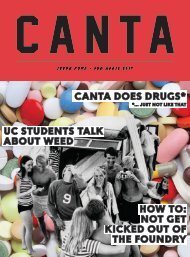Create successful ePaper yourself
Turn your PDF publications into a flip-book with our unique Google optimized e-Paper software.
22<br />
CANTA COLUMNS<br />
Submit your column to canta.editor@gmail.com<br />
The F-word<br />
Episode 1<br />
Welcome to our column! In this space the<br />
FemSoc exec will write about all things<br />
feminist and what happens on campus<br />
here at UC.<br />
For this first one, we thought we’d start<br />
with the most basic -- and maybe also the<br />
hardest -- question about feminism:<br />
What is feminism?<br />
Feminism questions taken-<strong>for</strong>-granted<br />
social notions that affect men, women,<br />
trans-people, gay people, intersex<br />
individuals, asexual people, racial &<br />
religious groups etc. Feminism stands <strong>for</strong><br />
creating a more just society by critiquing<br />
existing social structures that benefit<br />
only a certain section of the society. For<br />
instance, why are the suicide rates of men<br />
so high? Why do young women fall into<br />
eating disorders more than men?<br />
Why do we need it at UC?<br />
At FemSoc, we believe that UC should<br />
be as equitable and safe a space as<br />
possible -- and we think most people will<br />
agree with us on that. Un<strong>for</strong>tunately like<br />
on other campuses around the world,<br />
sexism, racism, homophobia, transphobia<br />
and other <strong>for</strong>ms of oppression sometimes<br />
happen on our campus as well. We would<br />
like to open discussions on these issues<br />
rather than hush them down so that we<br />
can find solutions and work toward a<br />
better, safer campus <strong>for</strong> all.<br />
Cutting Out the<br />
Middle-Man<br />
By Ollie O’Connell<br />
One of the seven holy sacraments,<br />
reconciliation causes much discom<strong>for</strong>t<br />
<strong>for</strong> the increasingly individualistic<br />
Catholic youth of today. The concept<br />
of telling your sins to a much older<br />
man who you rarely know, is difficult<br />
<strong>for</strong> privacy obsessed teenagers already<br />
genetically determined to defy authority.<br />
Why can’t they repent directly to God?<br />
Throughout my Catholic education I was<br />
persuaded, by either social pressure or<br />
teacher’s encouragement, to partake in<br />
the honest exercise. With acoustic music<br />
playing in the background, and the smell<br />
of incense in the air, tense students<br />
one-by-one entered hidden rooms where<br />
priests they had never met waited. It was<br />
awkward. I didn’t want to do it.<br />
Why can’t I confess in my bedroom? God<br />
is omniscient; it is declared in both the<br />
Old <strong>Test</strong>ament – “Even be<strong>for</strong>e I speak,<br />
you already know what I will say” (Psalms<br />
139:4) – and the New <strong>Test</strong>ament – “God<br />
is greater than our conscience, and<br />
he knows everything” (1 John 3:20).<br />
There<strong>for</strong>e, whether or not I’m truly<br />
remorseful is already known by God,<br />
and if he is infinitely benevolent, he<br />
will <strong>for</strong>give me regardless of a priest’s<br />
participation in the process.<br />
Biblical evidence supporting<br />
reconciliation is weak. When James says,<br />
“confess your sins to each other” (5:16),<br />
the ‘other’ is never defined. Earlier in<br />
John, when Jesus tells his disciples that<br />
“If you <strong>for</strong>give people’s sins, they are<br />
<strong>for</strong>given” (20:23), he doesn’t specify that<br />
this truth refers to all following priests.<br />
The modern Catholic Church has a<br />
perception problem among youth;<br />
letting sinful children and blasphemous<br />
teenagers to connect personally with<br />
God at their own speed, during their own<br />
time, in their own space, consequently<br />
eliminating the middle-man, would help<br />
bridge that gap.<br />
Zimmer-frame<br />
By Anon<br />
I remember when I first arrived here and<br />
I felt very alien – it didn’t help that I was<br />
an older student, walking around with a<br />
zimmerframe at the ripe old age of 26.<br />
.The good thing is, no one cares. The bad<br />
thing is, no one cares.<br />
Sometimes this place is overwhelming.<br />
It can be a lonely existence, where you<br />
go through the motions, in and out of<br />
lecture theatres and eating lunch alone.<br />
In my opinion it’s nothing like any other<br />
social construct we’re fed throughout life.<br />
Uni really is a place where you need<br />
to step out a little and do something<br />
different.<br />
It really helped me joining a society in my<br />
first week in campus. To be honest, there<br />
were only a few people I felt were normal<br />
in my club but hey, I was out of my<br />
com<strong>for</strong>t zone and meeting new people.<br />
This might seem basic, but make sure you<br />
attend tutorials too – it’s a chance to get<br />
to a different level with other people.<br />
At the end of it all, we’re all here <strong>for</strong> a<br />
similar reason; higher level learning<br />
and an outcome that betters our life.<br />
That’s a good enough reason to make a<br />
connection with someone!<br />
Issue 1.




